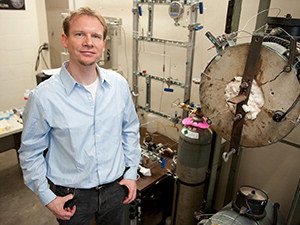Research Gets Down to Business

College of Science and Engineering faculty turn research into successful business ventures.
Research often starts with a passion—finding a cure, making a better product, or creating a more efficient system. Commercializing that research and bringing it to the marketplace is becoming a growing trend among faculty, especially those in the science and engineering disciplines.
Over the past five years, research by College of Science and Engineering faculty has generated 403 intellectual property disclosures, 129 patents, and nine start-up companies.
That’s potentially good news for the economy.
“Startups are probably the best way to get disruptive technology commercialized and into the hands of the public,” said Jay Schrankler, executive director of the University’s Office for Technology Commercialization (OTC).
The OTC is responsible for licensing University research for the development of new products and services. Whether the research is licensed to a startup or an established company, the objectives are the same: to benefit the public, foster economic growth, and generate revenue to support future University research and teaching. Last year, licensing agreements produced more than $45 million for the University.
"At the end of day, everyone wants to make an impact that improves a lot of our world's citizenry. I think that's what drives many of the academics in an institution."
— Brian Herman
Why so much more activity now? “We are getting a lot more engagement from faculty,” said Schrankler. That may be because the University has started sponsoring five workshops a year to show faculty the process and benefits of commercialization. “They get energized,” said Schrankler. “We’re getting faculty members who say, ‘I want to be part of a startup. I want to contribute this way.’”
University discoveries have launched 46 companies over the last six years. Ten have folded. “Thirtysix of them are still in business,” said Schrankler. The high success ratio is a validation of the criteria the OTC uses to decide whether to try to commercialize a technology. “They’ve raised money, they’re live and they’re viable. For now that’s a good metric,” he said.
Among the University’s most recent startups are four that have licensed technology developed by researchers in the College of Science and Engineering. The stories of these professors and their discoveries follow.
The stories are unique. Some who discover a new technology want to take a big role in the startup that develops. Others are content to spin a company off and get back to their labs. Sometimes the startups show immediate promise. In other cases, they may have to fight to get attention in the market.
But if there are common threads to all startups, they are these: First is a promising idea that can be protected by patent or copyright. And second is the belief the new technology can contribute to a better future.
“At the end of the day, everyone wants to make an impact that improves a lot of our world’s citizenry,” said Brian Herman, University of Minnesota Vice President for Research. “I think that’s what drives many of the academics in an institution. And the commercialization process is what allows that to happen in a very immediate fashion.”
[intlink id="3245" type="post"]Martin Saar: Mining the Earth for Power[/intlink]
[intlink id="3247" type="post"]Henry Liu: Developing Smarter Stoplights[/intlink]
[intlink id="3249" type="post"]Max Donath: From Distraction to Coach[/intlink]
[intlink id="3251" type="post"]Michael Tsapatsis: The Power of Membranes[/intlink]
